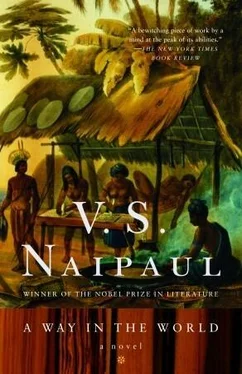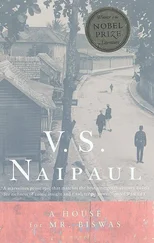USUALLY, WHEN I made these trips to Venezuela, I went first to Trinidad. From there after a few days, in a plane with a more local atmosphere, I did the hour-long flight across the Gulf and over the Venezuelan Caribbean coast to Maiquetía, the airport for Caracas.
It was on one such flight, on a Venezuelan aeroplane, that I met Manuel Sorzano. This was about fifteen years ago.
He had the window seat. I had the aisle seat next to him. Though he had gone aboard only a couple of minutes ahead of me, he looked quite established when I saw him. There were a number of parcels disposed about his feet, in spite of the regulations, and a few more in the locker above. Unusual, this sign that he had been shopping in Trinidad. In those days, of the oil boom, when there was money on both sides of the Gulf, the shopping traffic usually went the other way, to Caracas, with its skyscrapers and glittering commercial centres.
He was a small, elderly brown man, perhaps in his late fifties. His face, carefully shaven, was broad and wrinkled, with a closed expression that held just a hint of aggression. My first quick assessment — while I put away my own things — was that he was an out-and-out Venezuelan, a coastal mestizo, a product of a racial mixture that had started with the Spanish settlement, someone who had known only his own landscape and limited language and his own way of life, and was cut off from everything else.
Later I took in an unexpected touch of style in the old man: his curly hair was plaited and tied at the back into a tight little pigtail about an inch long. It gave him a piratical, eighteenth-century appearance. And I thought, though I hadn’t actually noticed it before, that the pigtail might have affected my first reading of his face, and made me see an aggression that perhaps wasn’t really there. But no: the pigtail was part of something a little too assertive about the man: below the buttoned cuffs of his shirt I could now see heavy gold or gilt bracelets, of linked big coins.
What was he taking back to Venezuela? I could see some long-playing records, in a plastic shopping bag; and, in a plaited raffia basket, label-less bottles and jars of Trinidad Indian pickles. Those pickles looked home-made. Had I misread him, then? Was he, after all, an Asian Indian from Trinidad, with ideas and assumptions I could intuit — and not the Venezuelan stranger I had taken him for? I considered his appearance. He was unusual. He could be one thing or the other: it depended on what you thought he was.
I asked him, “Are you from Trinidad?”
“No. Venezuela.” He was firm. But his accent was of Trinidad.
We were now airborne, and in a few minutes were flying low over the Gulf, so much bigger than I had thought thirty or forty years before, a little sea, with for some time no sight of land on either side. The water was of different shades of olive, in wide, distinct, irregular bands, sometimes frothing white or yellow at the edges: Orinoco and Atlantic in eternal conflict, mighty volumes of water pressing against each other.
I asked, “Where in Venezuela do you live?”
“All over. My work take me all over. Presently I am in Ciudad Guayana. But I know all over. Barquisimeto, Tucupita, Maracaibo, Ciudad Bolívar. Even Margarita for a time.”
He seemed to love the sound of the place names: it was as though to speak the names was to have a claim on the places.
I said, “Ciudad Bolívar used to be called Angostura. It was where they first made the bitters.”
I thought the fact romantic, and thought it would appeal to him. He paid no attention. I let go; I didn’t try to think of new things to say.
We had then to fill in disembarkation cards.
He said, “You have to give me a little hand with this. I don’t have my glasses.”
He took out his passport. It was Venezuelan, reddish brown, and he handled it very carefully (the way I handled my own British passport, always nervous, when I was travelling, of losing it, and doubting whether, if I lost it, I would be able to explain myself to anyone in authority). He passed it to me, and I saw his photograph, and his name, Manuel Sorzano. I knew the name Sorzano from the late eighteenth-century Venezuelan records. It was a good solid Venezuelan name then; but perhaps Venezuela was full of Sorzanos. The occupation of this Sorzano was given as carpintero, carpenter.
He took the passport back and put it away. He said he had to get it renewed every year. He did a lot of travelling. The previous year a new passport cost thirty-five bolívares, thirty-five “b’s”; this year it was going to cost seventy-five b’s. There were two b’s to the dollar. He was wrong there; the dollar was worth less than half that; and I thought it strange, in a man who did much travelling and wore heavy gold bracelets, that he didn’t know this basic fact about the Venezuelan currency.
Then, as though rewarding me for filling in his disembarkation form and not asking difficult questions, he showed me the new records in the plastic bag. They were of Hindi devotional songs. Some had been done by a Trinidad group, some by a woman singer, Dropati, from Surinam, the former Dutch Guiana.
It was his way of saying that he was an Indian from Trinidad — and at the same time letting me know I wasn’t to ask him any more about it. So, once again, his appearance subtly altered; he became what I had been told he was. But though he wasn’t the stranger I had thought, he was in some ways still strange, far from me, because of his religious needs, which I didn’t have, and his mangled idea (hard to imagine) of the old gods of India, and their due rites.
When the steward offered a snack-tray, Manuel Sorzano refused to have it. He didn’t eat meat, he told me, and he didn’t drink. I was surprised. I hadn’t thought of him as that kind of Hindu. But I didn’t really believe him. I thought he had the face of the Trinidad Indian drinking man — the soft, pressed-down lips, the sagging cheeks, the aggressive, watery eyes. But then it occurred to me that he might be doing a penance of some kind; he might have made a religious vow. Perhaps the abstemiousness of which he was making such a show was connected with the funeral rites for someone in his family. Perhaps he had gone back to Trinidad for those rites.
He certainly knew about Trinidad rums. He said he had been hoping to take back some white rum to Venezuela, but his mind had been “so hot” in the last few days he had forgotten about it. Trinidad white rum was the best thing for a cold.
He said, “You sap a little bit on your head”—he made a delicate sapping gesture with his fingers, and I saw more of his gold-coin bracelet—“and you dab a little bit on your forehead, and the next morning the cold gone.”
We had left the Gulf behind. For some time now the Venezuelan Caribbean coast was passing below us, outlined as on a large map, blurred green land, stretches of white or red or brown beach, dark sea, little muddy stains at the mouths of little rivers. Just as space satellites show us a seemingly untouched world, where great cities are mere smudges, so, from the height of this Aeropostal plane, the Spanish Main was still like a new place.
In his earlier life, in Trinidad (his name there not given me, but I thought it would have been a name of the Asian sub-continent), he had had four children. In Venezuela, as Manuel Sorzano, he had nine children, and they all had Venezuelan names.
“It was like choosing names out of a hat. One call Antonio, another one Pedro. The first girl call Dolores. The mother love that name.”
Who was the mother of the nine? He said she was an Indian. He meant an Asian Indian. “She talk only Indian.”
Hindi had ceased to be a living language in Trinidad or Guyana, and this meant that the mother of Manuel Sorzano’s Venezuelan children came from Surinam, the homeland of the Hindi singer Dropati.
Читать дальше












